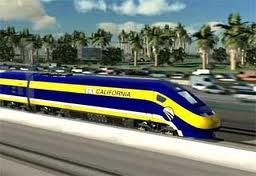High-Speed Rail hearing cuts off opposing speakers
Feb. 26, 2013
By Katy Grimes
SACRAMENTO — At Assembly Transportation Committee hearings in the Capitol on Monday, Assemblywoman Bonnie Lowenthal, D-Long Beach, cut the microphone of two speakers during the three minutes left for public comment at the end.
The two members of the public raised some real concerns about discriminatory language contained within the hiring agreements of the California High Speed Rail Authority Project Labor Agreements. But Lowenthal, the committee chair, wouldn’t hear it, nor would she allow anyone else to hear it.
By the end of the hearing, when Lowenthal wrapped up legislators’ questions, it was 2:27 p.m. and time for public comment. Lowenthal announced that they had the committee room until 2:30. She told those wishing to make public comment to make it quick.
Eric Christen, a representative for fair employment in construction, said there was discriminatory language in the construction Project Labor Agreement the CHSRA is responsible for. Christen said the PLA was a “give-away to the unions.”
Christen explained the CHSRA required in recent bid specifications that the winning design-build entity and its subcontractors sign a Project Labor Agreement with unions in the State Building and Construction Trades Council of California.
Lowenthal cut off Christen’s microphone.
A draft Project Labor Agreement for the first segment of the California High-Speed Rail was included as Addendum 8 in the Request for Proposal to the five pre-qualified design-build consortiums for the initial construction segment from Madera through Fresno, according to Christen. It contains the standard boilerplate language used in most Project Labor Agreements that contractors must sign with unions to work on government projects in California. Christen provides the information at California High-Speed Rail Scam.
Open competition
Nicole Goehring, with Associated Builder and Contractors, said they had been advocating for a fair and open competition policy all along, but Lowenthal cut her off as well.
Goehring later told me that, without critical changes, the discriminatory language will remain in the PLAs and prevent qualified California workers from competing for work on the project. Goehring said the PLA not only shuts out Merit Shop Contractors, but seriously limits California workers, including the nearly 1,800 students that are currently enrolled in ABC’s craft and apprenticeship programs, from working on this project.
Goehring said the PLA was created to benefit only the construction unions and not the 83 percent of California workers who choose not to be in a union. She said, “This section puts the unions in control of all craft labor for the project despite the fact that they represent only 17 percent of California’s construction workforce.”
That was just at the tail end of the hearing. The first 57 minutes displayed the Legislature’s continued refusal to grill CHSRA executives about what’s really going on.
Rail Authority CEO
“Early on, the High-Speed Rail Authority stumbled in its projections, its estimates and its outreach, and the Legislature responded with countless hearings, inquiries, and reporting requirements,” Lowenthal said during her opening statement.
Lowenthal said the purpose of Monday’s hearing was to “move forward,” leaving past worries and concerns behind.
But she did not say it was only when the CHSRA lied about ridership projections and job creation, and got caught, that the full Legislature was forced to respond. Up to that point, legitimate concerns over the high-speed rail debacle came primarily from the Republican minority.
High Speed Rail Authority CEO Jeff Morales proved once again that he can kill time during the mandatory hearings, and barely say anything of substance. At Monday’s hearing, Morales was allowed by Lowenthal to drone on, while most of the committee members tossed him softball questions. I have attended nearly every committee hearing on High-Speed Rail, whose officials rarely are asked to answer anything in detail.
Who is Jeff Morales?
Morales came to the CHSRA from California’s largest agency, Caltrans, where he worked for 3-1/2 years under Gov. Gray Davis. Morales resigned when Davis was voted out of office in the historic 2003 recall election. Many question the conflict of interest in Morales’s role as CEO at the rail authority. Morales is a former senior vice president at Parsons Brinckerhoff, an international transportation consulting firm, and also the primary contractor on the rail project.
The choice of Morales reinforced “a long tradition of inside dealing within the authority,” California Rail Foundation president Richard Tolmach said at the time. “An outside observer could be excused for thinking the CEO’s job is to grease payments for Parsons Brinckerhoff.”
Morales is supposed to receive a $25,000 bonus on top of his $365,000 salary if he meets a few goals: establishing a management plan to oversee CHSRA contractors; filling the vacant positions among the senior staff; appointing a risk-management officer; successfully awarding contracts for the first construction projects at or below engineering cost estimates; meeting goals for including small businesses and businesses owned by minorities, women and disabled veterans in construction contracts; and making major improvements to the agency’s outreach to the public, communities, property owners and other stakeholders along the route.
It looks as though Morales will receive the bonus, because supposedly meeting those goals is exactly what he spoke about at the hearing, on the record. Morales told the committee the vacant positions have been filled, the authority doubled its staff, and he put in place more management.
Morales said that, by this summer, the CHSRA will be awarding construction contracts. He spoke about the CHSRA small business advocate who was hired to facilitate including small businesses and minority-owned businesses.
And Morales discussed the outreach the rail authority has done with land owners in the Central Valley.
Legislators’ questions
Assemblyman Jim Patterson, R-Fresno, asked Morales to explain the CHSRA calculation used to claim 20,000 jobs will be created by high-speed rail. “In the business plan, it appears there is a multiplier used; one job equals one year,” Patterson said. “This inflates the number. How many real long term jobs are there?” Patterson asked.
Morales said, “20,000 are job years. It’s an industry standard used.”
“Without the multiplier, how many jobs will there be?” Patterson asked again.
“The multiplier is used over many years, created by the level of investment,” Morales said, dodging the answer.
According to the Assembly Republican Caucus, “HSRA uses a highly misleading methodology to inflate job estimates. Estimates of jobs created are represented in ‘job-years.’ One year of full employment equals a job-year. One person employed for 20 years equals 20 ‘jobs’ under this system.”
After Patterson asked another question about the lack of private investment involved, Lowenthal interrupted him to take questions from other committee members.
Fortunately, Vice Chairman Eric Linder, R-Corona, was next. “Who will be responsible for inspecting the building?” Linder asked.
“Many layers of state employees,” answered Morales. “It’s consistent with how design-build work is done around the state. State people need to make state decisions, and public people need to make public decision. They need to be accountable.”
Morales said the rail authority is “holding meetings on-the-record” to involve private sector people and companies. And they are holding “informal discussions with investors to help shape the best path forward.”
Related Articles
State-funded disabled care center settles assault case with paltry $400,000
A care-giving facility for disabled adults and the taxpayer-funded groups that oversee it have settled a 2011 lawsuit that accused
CA tax increases fund unaccountable spending machine
Nov. 20, 2012 By Mark Landsbaum On Nov. 6, Californians voted to raise taxes, but weren’t told the whole story.
Silly Bills
Sensitive as I am to the plight of the California legislator during such a difficult economic time, the need to




